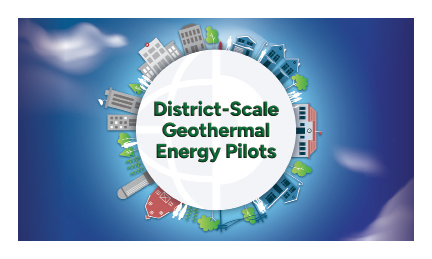
The District-Scale Geothermal Energy Pilots initiative, formerly the Community Geothermal Heating and Cooling (CommGeo) initiative, is a first-of-its-kind funding opportunity within the Office of Geothermal (OG) that focuses on empowering communities to make decisions about their energy futures, with input from those affected by those decisions. With the community coalition approach, OG endeavored to give voice to a range of stakeholders—not just zoning boards, public utility commissions, and other conventional decision-making bodies, but actual communities, installers, and others as well. OG organized a Community of Practice around these projects, where representatives from the selected coalitions discuss their community engagement, design, and deployment plans with each other, fostering shared learning to further support community-centered project development and collaboration.
Through this initiative, OG is currently supporting three communities to install geothermal heating and cooling systems (including district-scale systems often referred to as “Thermal Energy Networks”) in the second phase of the initiative. The projects were downselected from 11 projects funded in the first phase of the initiative, where coalitions selected project sites, assessed the geothermal resource and permitting needs, conducted feasibility analysis and local engagement, and identified workforce and training needs.
The three projects feature two urban/suburban communities and one rural community that will employ a range of system sizes, technologies, and innovations—offering diverse installations that will help other communities see how they can also implement district-scale geothermal. The selected projects will be installed by coalitions offering skills and expertise in community needs, workforce, design and analysis, and installation.
The selected project locations and leads are:
- Ann Arbor, MI — Lead: City of Ann Arbor
- Framingham, MA — Lead: Home Energy Efficiency Team [HEET]
- Shawnee, OK — Lead: University of Oklahoma
Widespread adoption of geothermal heating and cooling systems can help electrify the building sector, reduce energy costs for families, and boost grid resilience. Learn more about geothermal heating and cooling on OG’s website.
Additional Information
To stay current with the latest OG news, subscribe to all OG emails or subscribe to GO's monthly Drill Down newsletter.
To learn about other kinds of geothermal funding and assistance programs, check out our Opportunities for Communities and Engagement with Tribal and Native Communities pages.

